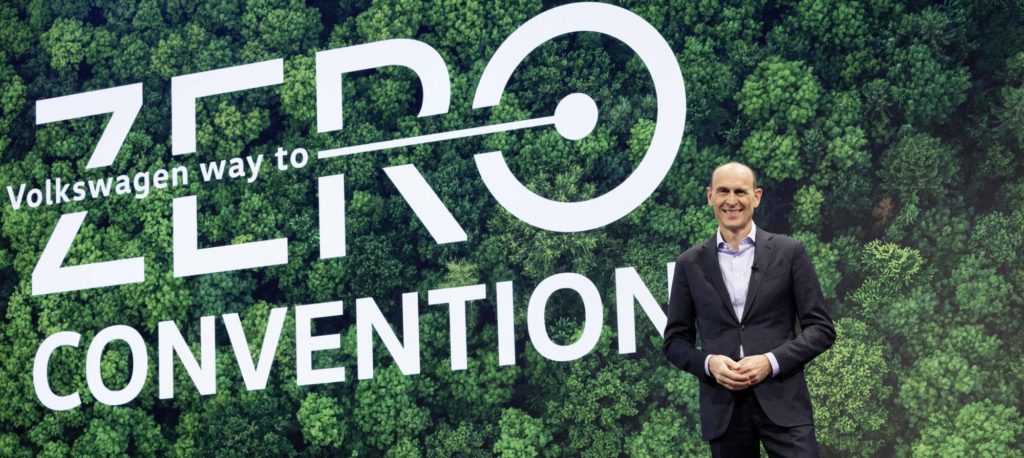VW outlines large-scale energy production as part of carbon-neutrality plans
29 April 2021

Volkswagen (VW) has become the latest carmaker to outline its carbon-neutrality plans as part of a greener outlook for the automotive industry.
Alongside the growth of the electrically-chargeable vehicle (EV) market, awareness of sustainability is also growing. Manufacturers are conscious of the potential of having ′double standards, promoting zero-carbon transport while producing models in highly polluting atmospheres.
VW’s ′Way to Zero’ roadmap outlines its aims to cut CO2 emissions in Europe by an average of 17 tons per vehicle by 2030. This would mean 40% less emissions than its 2018 figures. To achieve this goal, the carmaker will invest €14 billion into its decarbonisation strategy by 2025 while switching to renewable energy for all its European, US and South American plants by 2030.
The company aims to be net carbon neutral by 2050 at the latest. In the future, the carmaker will look at the systematic recycling of the high-voltage batteries from older EVs, adding to its sustainable credentials.
′Volkswagen stands for sustainable e-mobility for all. We’ve set out on the ′Way to Zero’ and are consistently placing the environment at the focus of all our activities,’ said Ralf Brandstätter, CEO of VW. ′Our big electric offensive was just the start. We are taking a holistic approach to decarbonisation: from production through service life to recycling. And we’re the first carmaker to support the expansion of renewable energies on an industrial scale.’
Green energy
Although EVs do not emit CO2 themselves, there have been questions around their actual carbon neutrality. Manufacturing and charging are both presumed to be using large amounts of energy.
VW has noted that in the charging phase, to achieve the goal of being greener, the energy used needs to come entirely from renewable sources – not just for its own vehicles, but across the entire sector. This alone would reduce CO2 emissions by almost half, compared with the standard European Union electricity mix, the company believes.
′Volkswagen is the first carmaker to directly support the expansion of renewable energy on a large scale,’ it states. ′As a result, new wind farms and solar plants are to be constructed in several regions of Europe by 2025.’
The carmaker already offers renewable energy-based charging to its customers through its Volkswagen Naturstrom business (charging at home) and Ionity (public charge points) involvement. Yet being involved in the generation of this energy will also give the carmaker assurance on its carbon-neutrality goals.
Contracts for the first projects have already been signed with energy company RWE. In Germany, VW is supporting the construction of the largest independent solar project, a plant with a total capacity of 170 million kilowatt-hours each year from 420,000 modules. The associated plant will be completed in Tramm-Göthen in north-eastern Germany by the end of 2021 and is being constructed without any state subsidies.
In total, all VW’s planned projects together will generate around seven terawatt hours of additional green energy by 2025. The amount of renewable electricity going into the grid will grow in parallel with the number of its ID. battery-electric vehicles (BEVs). In this way, VW is improving the climate footprint of the sub-brand and creating the basis for the net carbon-neutral use of its electric fleet.
Green production
The production process, and the entire supply chain, is also responsible for a high output of carbon emissions. VW is aware of this and currently relies on renewable energy for all its European plants. By 2030, this adaptation will be expanded to all manufacturing facilities worldwide, except for China. All gigafactories announced as part of the company’s Power Day earlier this year will also be run entirely on renewable energy.
In the future, the carmaker states it will identify the most significant contributors to CO2 emissions in the supply chain and work to reduce this output. The role model for this process will be battery-cell production for the ID.3 and ID.4, which already use green-energy sources and therefore have a substantially improved carbon footprint.
Alongside production methods, the manufacturer will also switch to using more sustainable components. Its ID. models will include tyres made from low-emission production methods, while battery housings and wheel rims will feature ′green’ aluminium.
′There are more than ten focus components, which will enable us to improve the carbon footprint of the ID. family by around two tons per vehicle in the years ahead,’ the company said.
VW will also make CO2 emissions a key criterion in any contract it awards to suppliers in the future. The company will help these businesses gradually improve their own carbon footprint and ensure the sustainability of its supply chain.
Green future
The systematic recycling of batteries, which will allow more than 90% of raw materials to be reused in the future, is intended to contribute to reducing CO2 emissions.
The company’s goal is for a closed loop for the battery and the raw materials at its disposal across the VW Group. An initial pilot kicked off at the carmaker’s battery-recycling plant in Salzgitter.
These plans follow the carmaker’s announcement in March that it is pushing forward with its transformation into an electric, software-driven mobility provider. Its Accelerate strategy aims for the full electrification of the vehicle fleet, with 70% of this achieved by 2030. In addition, VW will be launching at least one new electric car each year.
′The ′Way to Zero’ is our roadmap for effective climate protection, with clear and ambitious milestones,’ added Brandstätter. ′We live up to our responsibility for the environment. The ′Way to Zero’ will provide us with a real competitive advantage. In the future, employees, customers and investors will give preference to those companies which place their social and environmental responsibility at the heart of their business. Sustainability will thus become a crucial factor in corporate success.
′However, Volkswagen cannot shoulder the decarbonisation of mobility on its own. Government, industry and society need to come together to develop good ideas and make courageous investments.’